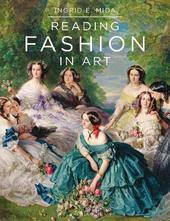
|
Reading Fashion in Art
Paperback / softback
Main Details
| Title |
Reading Fashion in Art
|
| Authors and Contributors |
By (author) Ingrid E. Mida
|
| Physical Properties |
| Format:Paperback / softback | | Pages:224 | | Dimensions(mm): Height 246,Width 189 |
|
| Category/Genre | Art History
History of fashion |
|---|
| ISBN/Barcode |
9781350032705
|
| Classifications | Dewey:704.949391 |
|---|
| Audience | |
|---|
| Illustrations |
74 color illus
|
|
Publishing Details |
| Publisher |
Bloomsbury Publishing PLC
|
| Imprint |
Bloomsbury Visual Arts
|
| NZ Release Date |
17 September 2020 |
| Publication Country |
United Kingdom
|
Description
Shortlisted for the CSA Millia Davenport Publication Award, 2021 Dress and fashion are central to our understanding of art. From the stylization of the body to subtle textile embellishments and richly symbolic colors, dress tells a story and provides clues as to the cultural beliefs of the time in which artworks were produced. This concise and accessible book provides a step-by-step guide to analysing dress in art, including paintings, photographs, drawings and art installations. The first section of the book includes an introduction to visual analysis and explains how to 'read' fashion and dress in an artwork using the checklists. The second section offers case studies which demonstrate how artworks can be analysed from the point of view of key themes including status and identity, modernity, ideals of beauty, gender, race, globalization and politics. The book includes iconic as well as lesser known works of art, including work by Elisabeth Vigee le Brun, Thomas Gainsborough, James Jacques Tissot, Marcel Duchamp and Man Ray, Yinka Shonibare, Mickalene Thomas, Kent Monkman and many others. Reading Fashion in Art is the perfect text for students of fashion coming to art history for the first time as well as art history students studying dress in art and will be an essential handbook for any gallery visitor. The step-by-step methodology helps the reader learn to look at any work of art that includes the dressed or undressed body and confidently develop a critical analysis of what they see.
Author Biography
Ingrid E. Mida (PhD, Art History & Visual Culture) is an art and dress historian. Responsible for the revival of the Ryerson Fashion Research Collection in Canada, Dr. Mida is the author of books, chapters, and articles on fashion and art, research methods in fashion and art history, curatorial practice, and museum studies.
ReviewsThis will be an invaluable resource for fashion and art history students, encouraging them to go beyond the simple process of describing, towards a deeper level of analysis ... This book will also be of interest to those without a background in fashion history who are seeking to become more confident in their ability to interpret the meaning of clothing in a painting, photograph, or print. More experienced dress historians may find they already apply many of the recommended practices subconsciously, although this book might help lend an additional layer of systematic rigour to the process, facilitating new insights. * The Journal of Dress History * Reading Fashion in Art offers a fantastic practical guide to tackling the process of analyzing the representation of dress in the visual arts. * Dress: The Journal of the Costume Society of America * It is thrilling to have a book that so clearly details how important the knowledge of existing dress and dress history is to the interpretation of apparel represented in other media, and to the enhanced understanding of works of art. * Jean L. Druesedow, Kent State University Museum, USA * A thorough, thoughtful guide to evaluating the role and impact of clothing in art - useful not only for students and scholars, but also for anyone curious about fashion or art. * Justine De Young, Fashion Institute of Technology, USA * An important, accessible book that beautifully highlights the symbiosis between art and fashion history ... At its core is an approach which is sorely needed in scholarship and beyond: the acknowledgement that appreciation, understanding and enjoyment is best gained through slow, insightful engagement with the past. The tools to achieve all three are presented within these pages. * Lydia Edwards, Author *
|